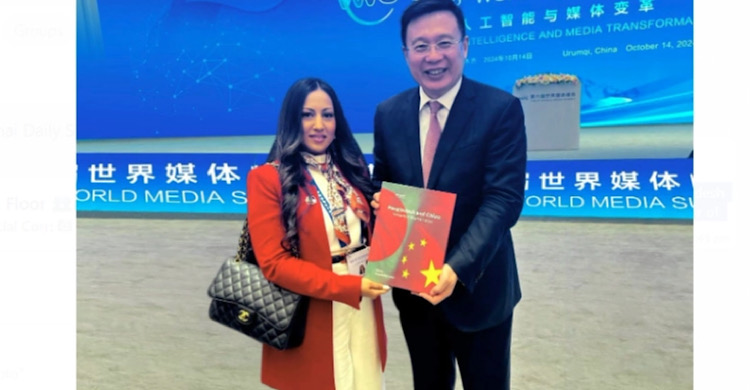6th World Media Summit: Industry leaders discuss AI’s potential, ethical implications for journalism’s future


The 6th World Media Summit, which concluded on October 17 in Urumqi, China, brought together global media leaders to discuss the transformative impact of artificial intelligence (AI) on journalism. The application of generative AI and large language models (LLMs) was a central theme, with leaders debating both the opportunities and challenges AI presents to the industry.
A major highlight of the summit was the release of a report titled “Responsibilities and Missions of News Media in the Age of Artificial Intelligence” by Xinhua News Agency's National High-end Think Tank Research Group. The report surveyed media organizations across 53 countries and revealed that 10.2% of media outlets have fully integrated AI into their production processes, while 41% are actively exploring its application.
The report identified three main areas where generative AI is being used or considered by media outlets: auxiliary editing (fact-checking, transcription, translation), content creation (generating summaries, charts, and digital anchors), and topic planning (drafting outlines for news coverage). These tools aim to improve newsroom efficiency without replacing the human creativity essential to in-depth journalism.
Speaking at the summit, Yan Lingsi, Vice President of Reuters Asia Pacific, noted the excitement surrounding AI's ability to reduce repetitive tasks in newsrooms and enhance journalists' capabilities through new AI-driven tools. This shift, Lingsi added, has the potential to redefine the future of journalism.
Yet, as AI-generated content becomes more prevalent, concerns about job security in the industry have surfaced. Iqbal Sefer, Chairman of South Africa's Independent Media Group, addressed these concerns, likening AI's role in media to that of an architect. AI can build the framework, but the rich details, depth, and human touch that define compelling journalism still require human intervention, he said. Similarly, Suresh Nambas, Editor-in-Chief of The Hindu, emphasized that while AI can enhance creativity by providing new tools, it cannot replace the critical thinking and emotional intelligence that journalists bring to their work.
Beyond newsroom efficiency, the summit also tackled the ethical concerns surrounding AI, particularly the rise of misinformation and disinformation. Chang Qide, Resident Coordinator of the United Nations Development System in China, addressed the importance of combating the spread of false information, particularly as AI advances. “This summit has created an opportunity for global media to enhance the credibility of information in dealing with false information, misinformation, and hate speech,” Chang said in a video message.
To mitigate the risks associated with AI in media, organizations such as Xinhua News Agency, Reuters, BBC, and NPR have introduced AI behavioral guidelines aimed at preserving authenticity. In 2023, AFP joined forces with major European media organizations to call for clearer identification of AI-generated content, ensuring transparency and helping audiences distinguish between human-generated and AI-generated information.
Nahar Khan, Executive Editor of United News of Bangladesh (UNB), actively participated in the summit and shared her insights on AI’s role in shaping the future of digital newsrooms. UNB, the first fully digitalized private sector wire service in South Asia, has embraced AI to streamline its news drafting processes.
“We’ve integrated AI tools into our newsroom to enhance speed and efficiency, especially in fast-paced news cycles where even minutes can make a difference,” Khan explained. She also emphasized that UNB is developing a custom-built dashboard to empower journalists, allowing the organization to stay responsive to reader preferences and improve content strategies.
Khan highlighted the importance of global collaboration and innovation, noting, “The World Media Summit provides a platform for exchanges in areas like news sharing, cultural collaborations, technology transfer, and joint initiatives. In today’s interconnected world, these collaborations are crucial for media organizations to thrive.”
The discussions at the summit underscored the evolving relationship between AI and journalism, as media organizations around the world adapt to technological advances while navigating the ethical challenges that accompany them.
